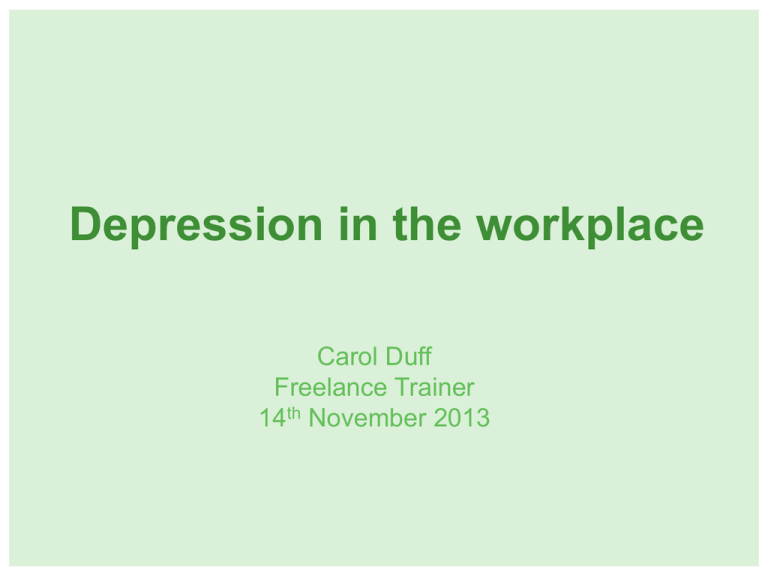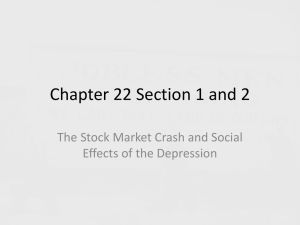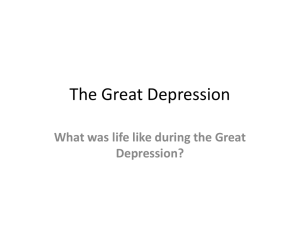Depression in the workplace
advertisement

Depression in the workplace Carol Duff Freelance Trainer 14th November 2013 Aims Myths around depression and mental health conditions What is depression Depression in the workplace How to help someone Training available Fact Or Fiction? Depression is common Depression is rare and unusual and none of my staff have a mental health condition 1 in 5 people will experience depression at some point in their lives Fact Or Fiction? The vast majority of People with severe mental health conditions are people who have not able toexperienced work a mental health condition continue or return to work successfully Fact Or Fiction? Being out of work can be more detrimental to mental makes health mental health problems worse Working There is evidence that work is generally good for health and wellbeing However poor conditions in the workplace can impact on poor mental health therefore it is essential to foster a healthy work environment Fact Or Fiction? Someone who has previously had a mental health Although people can condition will have a bad sickness record in the and do sometimes future need time off work Over 70% of with their mental people have a health condition – single episode most can and do and then fully recover and only recover some experience problems over a longer period of time Stigma and disclosure Many people don’t disclose a mental health condition for fear of discrimination Many people don’t understand mental health conditions and avoid talking about them This can exacerbate the issue Finding the balance Employers want need to to maximise be able to productivity recognise signs and also of illsupport health and provide employees appropriate support They need to understand how to encourage good mental health Depression Everyone feels sad, fed up or miserable sometimes But for some people, depression goes on for longer, and becomes so severe that they find it hard to carry on with their normal lives Continuum of Mental well being Mental illness Positive mental wellbeing Clinical depression A clinical depression is one that lasts for at least 2 weeks and affects the person physically, emotionally, cognitively and behaviourally It interferes with the person’s ability to carry out his or her work or to have satisfying personal relationships. Emotional Changes Sadness Increased anxiety or stress Feelings of guilt Anger Mood swings Lack of emotional responsiveness Helplessness Hopelessness Changes in thinking Frequent self-criticism Self-blame Worrying Pessimism Poor memory and concentration Difficulty making decisions Confusion Tendency to believe that others see you negatively In severe cases thoughts of death and suicide Physical changes Chronic fatigue Lack of energy Sleeping too much or too little Overeating or loss of appetite Constipation Weight loss or gain Irregular menstrual cycle Loss of libido Unexplained aches and pains Changes in Behaviour Crying spells Withdrawal from others Neglect of responsibilities Loss of interest in personal appearance Loss of motivation Making more mistakes How depression might present in workplace? Decreased productivity Morale problems Lack of co-operation Safety problems Absenteeism Frequent complaints of being tired all the time Complaints of unexplained aches and pains Alcohol and/or other drug misuse What can you do to help or advise Help the person to feel hope and optimism Understand that depression is common Depression is a real medical condition Effective help is available What doesn’t help Being told to snap out of it Being told to cheer up Being made to feel a failure Depression being seen as a weakness Where can you get help for depression? Self help GP Counselling Cognitive behaviour therapy Local groups i.e Cruise Medication What can help in the workplace? Raising awareness of mental health conditions Promoting well-being Identifying the early warning signs and talking at an early stage Keeping in touch during sickness absence Occupational health Considering reasonable adjustments Ongoing support and review Benefits of Intervention • The total cost to employers is estimated at nearly £26 billion each year • That is equivalent to £1,035 for every employee in the UK workforce • Simple steps to improve the management of mental health in the workplace should enable employers to save 30% or more of these costs at least £8 billion a year Training available • Mental Health First Aid ( 2 day course) • Mental Health First Aid Lite ( 3 hour session) • Line Managers Mental health awareness ( 6 hours) • Employee Mental Health Awareness ( 3 hours) • Managing stress in the workplace Summary None of us are immune to mental health conditions Both the employer and the employee are responsible for looking after their own mental wellbeing Small changes and proactive support can encourage good mental health and in turn maximise productivity There is help and support available Useful information • • • • • • • • www.centreformentalhealth.org.uk/employment www.moodgym.anu.edu.au www.depressionalliance.org.uk www.mentalhealth.org.uk www.mind.org.uk www.mindfulemployer.net www.hse.uk www.mhfaengland.org/news/mhfa-england-updatesshift-line-managers-resource • www.getselfhelp.co.uk • www.ntw.nhs.uk/pic/selfhelp Thank you & questions Contact Details carol.duff@rdash.nhs.uk







